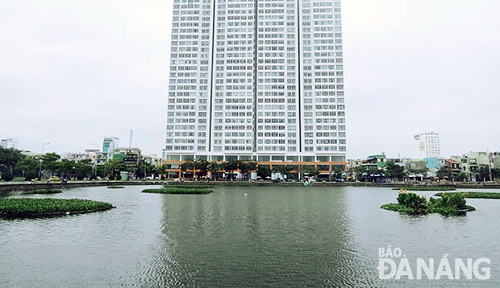Efforts to make Thac Gian Lake more pleasant
The Thac Gian Lake alongside Ham Nghi street is considered to be the lungs of Da Nang’s Thanh Khe District, and it is now an ideal place for local residents living nearby to enjoy moments of leisure and relaxation.
In the past, the lake was called the Thac Gian Pond, but it was overgrown with rushes, lotus flowers and water lilies. The fast rate of urbanisation was considerably shrinking the area of the lake and a large volume of domestic effluent from residential areas nearby was being discharged into the lake, and its sluice gates were blocked by garbage. As a result, the lake became a seriously environmental pollution hotspot at that time and people who passed by had to put up with a sickening stench wafting off the lake.
 |
| The lake - an airy and peaceful space in the city |
Since 2006, many effective measures have been taken to resolve the problem of environmental pollution in the lake. The focus has been on dredging the thick sludge out of the lake, treating the solid waste, installing drain grates, and upgrading all the sluice gates. In addition, many patches of ‘beo luc binh’ (Eichhorina crassipes) have been grown in the lake in order to give it a higher aesthetic value, alleviate the bad smells, and create an airy space. Now, from early morning through into the evening, many local residents gather to go fishing, do physical exercise or take strolls to enjoy the fresh air and cool breezes along the banks of the lake.
In an active response to the city’s “Year for Culture and Urban Civilisation 2015” programme, a volunteer team has been set up by the Thac Gian Ward authorities. These volunteers have become involved in cleaning up the environment around the lake on Sundays to implement the city’s “Green, Clean and Beautiful Sundays” movement. In addition, the district’s urban order management team are regularly monitoring to prevent illegal pavement encroachment for the purpose of trade nearby.